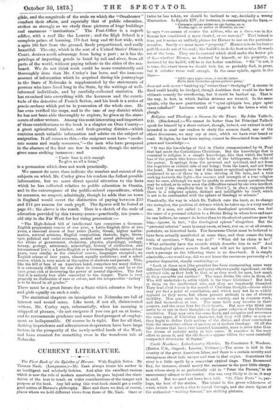CURRENT LITERATURE.
The First Book of the Epistles of Horace. With English Notes. By Thomas Nash. (Longmans.)—Mr. Nash always treats his author in an intelligent and scholarly fashion. And after the excellent custom which is now the rule of modern annotation, he goes beyond the eluci- dation of the text to touch on wider considerations of the temper and purpose of the book. Any lad using this text-book should get a really good notion of Horace's philosophy. Here and there we find, of course, places where we hold different views from those of Mr. Nash. Once or twico he has taken, we should be inclined to say, decidedly a wrong illustration. In Epistle XIV., for instance, in commenting on the liuee,— " Certemas spines animo ne ego tortilla, an to Evellas agro, et melior sit Iloratius, an roe," he says "res means of course the viaicus, who as a slave was in the Roman law considered a mere chattel, or res mancipi." That indeed is true, yet it seems an unlikely phrase for Horace to use on the particular occasion. Surely res must mean "property." Horace is to do his best to pull ill-weeds out of his soul ; the bailiff is to do his best to take ill-weeds out of the farm. They are to contend which shall make the better job of it,—whether Horace, as doctored by himself, or his property, as doctored by the bailiff, will be in the better condition. " Sit " is not, it is true, the exact tense wo should look for, or probably find, in prose, but it satisfies verse well enough. In the same epistle, again, in the lines— •
" Addit opus pigro rivus, si decidit 'tuber, Multa mole docendus aprico weer° prato,"
does not mole mean " banking up," rather than" dredging ?" A stream in flood could hardly be dredged, though doubtless that would be the best ultimate remedy for overflowing, but it could be banked up. That is the way, in fact, in which Italian streams are treated. In the same epistle, why the now punctuation of " optat ophippia boa, piger optat arare caballus?" Laziness would not suggest to the horse a wish to plough.


































 Previous page
Previous page